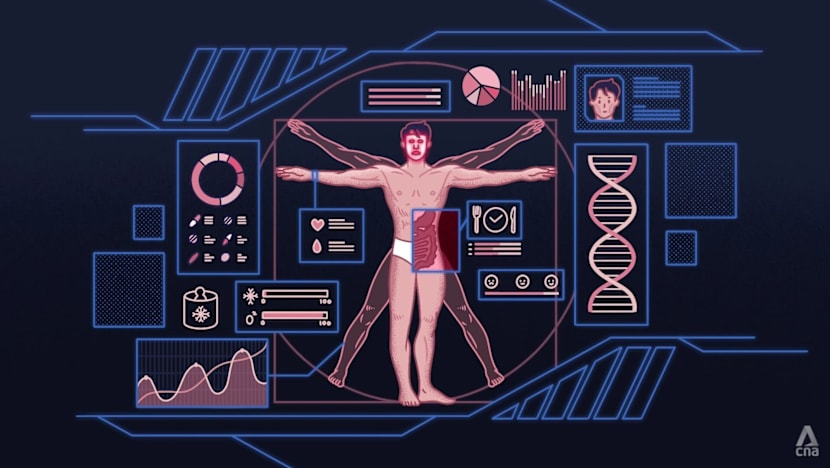Health
Biohacking: Can It Transform Our Approach to Health and Ageing?

The rising trend of biohacking is attracting attention as individuals seek to enhance their health and prolong their lifespan through unconventional methods. Among them is 43-year-old entrepreneur Nicholas Lin, who meticulously curates his daily routine to optimize both his physical and mental well-being. His regimen includes a strict sleep schedule, an array of supplements, and various high-tech devices aimed at improving his health as he ages.
Each morning, Mr Lin begins his day after seven hours of uninterrupted sleep, followed by a breakfast accompanied by 34 different supplements, including berberine, glycine, fish oil, and biotin. His daily caloric intake ranges from 2,050 to 2,250 calories, with a focus on high protein content, primarily from grass-fed beef, eggs, and protein powders. After a low-impact strength training session, he dedicates time to his “anti-ageing room,” which is equipped with red light panels and an oxygen concentrator to potentially enhance cellular health and reduce inflammation.
Mr Lin’s commitment to biohacking began over a decade ago, driven by a desire to maintain peak mental and physical performance as he enters his mid-40s. “I thought about what my mental and cognitive peak of my life was, and I figured that was around 26 or 27 years old,” he recalls. His approach to health has since morphed into a detailed protocol, meticulously logged in a 10-page document.
The biohacking community is not limited to Mr Lin. Fellow biohacker Vignesa Moorthy, 52, became involved after his mother was diagnosed with cancer in 2019. This prompted him to take charge of his health, focusing on longevity and quality of life. Moorthy, the founder of cybersecurity firm Vieqwest, has eliminated alcohol and cigarettes from his life and prioritizes sleep and exercise. He invests approximately S$50,000 (US$38,500) annually in biohacking, which includes regular blood tests and maintaining a personal longevity lab equipped with a hyperbaric oxygen chamber and various health-monitoring devices.
Professor Dean Ho, director of the Institute for Digital Medicine at the National University of Singapore, began his biohacking journey with a blood testing kit he received as a birthday gift in March 2021. Initially, it was a simple tool to track his glucose levels, but it quickly evolved into an extensive exploration of how data and science could enhance health and performance. He now participates in a research study, “Delta,” aimed at understanding individuals’ unique health trajectories and translating findings into evidence-based healthcare approaches.
The biohacking movement has gained traction as people seek various methods to improve their health, from lifestyle changes to advanced treatments like red light therapy and hyperbaric oxygen therapy. These methods have shifted from clinical settings into personal routines, allowing individuals to experiment with their health.
Despite the appeal of biohacking, experts caution against its potential pitfalls. While the intention to optimize health is commendable, many interventions lack robust evidence and safety data. Dr Laureen Wang, head of the Healthy Longevity Research Clinic at Alexandra Hospital, emphasizes that biohacking often resembles a “DIY approach” to health enhancement, which can lead to risky outcomes when enthusiasm overshadows scientific validation.
Professor Wang Yibin from Duke-NUS Medical School warns that translating findings from animal studies to human applications can be dangerous. “How much of that actually translates to humans needs to be tested through rigorous clinical studies,” he states.
The human body is complex, and what works for one individual may not be effective for another. This variability underscores the importance of personalized approaches to health management. The biohackers interviewed for this article acknowledge this nuance, with Mr Lin highlighting the necessity of flexibility in his health routine.
While the allure of biohacking often lies in high-tech solutions and trendy interventions, experts consistently assert that fundamental health practices remain paramount. Regular physical activity, balanced nutrition, quality sleep, and effective stress management are critical components of long-term health.
As biohacking continues to evolve, the movement’s core principles emphasize the importance of data-driven methods and personal responsibility in health management. It challenges individuals to listen to their bodies, make informed decisions, and take control of their wellness journeys.
In summary, biohacking represents a burgeoning intersection of science, health optimization, and personal agency. While it offers promising avenues for improving health, individuals must remain cautious and informed, ensuring that their approaches are grounded in reliable evidence and sound medical advice.
-

 Lifestyle3 months ago
Lifestyle3 months agoHumanism Camp Engages 250 Youths in Summer Fest 2025
-

 Sports3 months ago
Sports3 months agoDe Minaur Triumphs at Washington Open After Thrilling Comeback
-

 Business4 months ago
Business4 months agoKenvue Dismisses CEO Thibaut Mongon as Strategic Review Advances
-

 Sports4 months ago
Sports4 months agoTupou and Daugunu Join First Nations Squad for Lions Clash
-

 Top Stories4 months ago
Top Stories4 months agoColombian Senator Miguel Uribe Shows Signs of Recovery After Attack
-

 World4 months ago
World4 months agoASEAN Gears Up for Historic Joint Meeting of Foreign and Economic Ministers
-

 Business4 months ago
Business4 months agoOil Prices Surge Following New EU Sanctions on Russia
-

 Entertainment3 months ago
Entertainment3 months agoDetaşe-Sabah Violin Ensemble Captivates at Gabala Music Festival
-

 Health3 months ago
Health3 months agoNew Study Challenges Assumptions About Aging and Inflammation
-

 Entertainment3 months ago
Entertainment3 months agoBaku Metro Extends Hours for Justin Timberlake Concert
-

 Business4 months ago
Business4 months agoU.S. House Approves Stablecoin Bill, Sends to Trump for Signature
-

 Top Stories4 months ago
Top Stories4 months agoRethinking Singapore’s F&B Regulations Amid Business Closures









